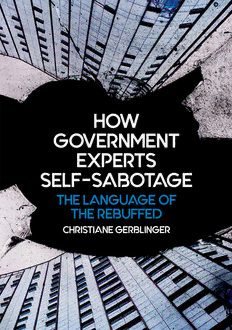Table Of ContentHOW
GOVERNMENT
EXPERTS
SELF‑SABOTAGE
THE LANGUAGE OF
THE REBUFFED
HOW
GOVERNMENT
EXPERTS
SELF‑SABOTAGE
THE LANGUAGE OF
THE REBUFFED
CHRISTIANE GERBLINGER
Published by ANU Press
The Australian National University
Canberra ACT 2600, Australia
Email: [email protected]
Available to download for free at press.anu.edu.au
ISBN (print): 9781760465414
ISBN (online): 9781760465421
WorldCat (print): 1348276255
WorldCat (online): 1348275956
DOI: 10.22459/HGESS.2022
This title is published under a Creative Commons Attribution-NonCommercial-
NoDerivatives 4.0 International (CC BY-NC-ND 4.0) licence.
The full licence terms are available at
creativecommons.org/licenses/by-nc-nd/4.0/legalcode
Printed by Lightning Source
ingramcontent.com/publishers-page/environmental-responsibility
Cover design and layout by ANU Press
This book is published under the aegis of the Public Policy Editorial Board
of ANU Press.
This edition © 2022 ANU Press
Contents
Abbreviations vii
Acknowledgements ix
List of Tables xi
Preface xiii
1. Introduction 1
Locating the phenomenon of rebuffed advice 1
Case studies and book structure 6
The language of policy advice 9
Primary materials and methodology 14
Do the rebuffed know they are a phenomenon? 18
Contribution and rationale 25
2. Strategies of Impersonality: Constructing a Framework
for the Rebuffed 27
Introduction 27
The text 32
The micro-context 38
The macro-context 46
3. Knowing What Not to Know: Advice on South Australia’s
Blackout and the Role of Renewable Energy 57
Introduction 57
Discussion of departmental advice 60
The text 77
The micro-context 91
The macro-context 109
4. Excess of Objectivity: Australian Intelligence Assessments
of Iraq’s Weapons of Mass Destruction 127
Introduction 127
Discussion of Australian intelligence assessments 131
The text 146
The micro-context 158
The macro-context 171
5. The Language of the Unrebuffed 203
Contemporaneous comparisons 203
Triangulation 213
6. Conclusion 229
Bibliography 245
Index 287
Abbreviations
ABC Australian Broadcasting Corporation
AEMO Australian Energy Market Operator
ALP Australian Labor Party
APS Australian Public Service
CIA Central Intelligence Agency
DEE Department of Environment and Energy
DIO Defence Intelligence Organisation
DLO Departmental Liaison Officer
FOI freedom of information
GST goods and services tax
HIP Home Insulation Program
IAEA International Atomic Energy Agency
InCiSE Index International Civil Service Effectiveness Index
ONA Office of National Assessments
PJCAAD Parliamentary Joint Committee on ASIO,
ASIS and DSD
PM&C Department of the Prime Minister and Cabinet
PMO Prime Minister’s Office
QTB Question Time Brief
SA South Australia
UK United Kingdom
UN United Nations
UNMOVIC United Nations Monitoring, Verification
and Inspection Commission
vii
HOW GOVERNMENT EXPERTS SELF-SABOTAGE
UNSC United Nations Security Council
UNSCOM United Nations Special Commission
US United States
WMD weapons of mass destruction
viii
Acknowledgements
For their time, close engagement and encouragement, I am indebted to
Joan Leach, Sujatha Raman and John Uhr.
I would not have been able to write this book without the generous
support of the Sir Roland Wilson Foundation, a scholarship fund set up
in partnership with the Australian Public Service to study and develop
public policy in Australia and overseas. I am particularly grateful to the
foundation’s board and its staff.
During my time in the Netherlands, I was pleased to spend several weeks
at the Nederlandse School voor Openbaar Bestuur (Netherlands School
of Public Administration) and am particularly grateful to Paul Frissen and
Eline van Schaik for their interest and help.
I would also like to thank my Dutch interviewees in The Hague for their
valuable time and participation: Michèle Blom, Michel Groothuizen,
Peter Hennephof and Frans Leeuw. In Australia, I am grateful to Ken
Henry and Paul McCullough for their thoughtful insights and for so
readily offering their time.
I am also thankful to many others for their help: Michael Brennan, Gerard
Castles, Jenet Connell, Carol Croce, Ted Crook, Frances Cruickshank,
Michael di Francesco, Grant Douglas, Peter Grabosky, Angelia Grant,
John Halligan, Lin Hatfield Dodds, Bea Hogan, Rob Hoppe, Maja
Horst, Justine Molony, Richard Mulgan, Beryl Radin, Brian Rappert, Ian
Shepherd, Paul ’t Hart, Martijn van der Steen and Stavros Zouridis.
Finally, thank you to the fantastic Andrew Kennedy, chair of the Public
Policy Editorial Board of ANU Press, for seeing this manuscript through
to completion.
ix
HOW GOVERNMENT EXPERTS SELF-SABOTAGE
Acknowledgement must also be made to the following, in which parts
of this work first appeared:
Chapter 2 (‘Strategies of Impersonality: Constructing a Framework for
the Rebuffed’) draws on material from an earlier article, ‘Peep Show:
A Framework for Watching How Evidence Is Communicated inside
Policy Organisations’, published in Evidence & Policy: A Journal of
Research, Debate and Practice on 14 February 2022, and reproduced with
permission of the Licensor through PLSclear.
Chapter 4 (‘Excess of Objectivity: Australian Intelligence Assessments
of Iraq’s Weapons of Mass Destruction’) draws on material from an
earlier article, ‘Waiting for Advice That Is Beyond Doubt: Uncertainty as
Australia’s Reason to Join the Invasion of Iraq’, published in volume 37,
no. 1 (2022) of Intelligence and National Security, pp. 109–25.
A much abbreviated overview of this book’s findings also appeared on
27 April 2021 as a post called ‘Are Experts Complicit in Making Their
Advice Easy for Politicians to Ignore?’ on the LSE Impact Blog.
x

